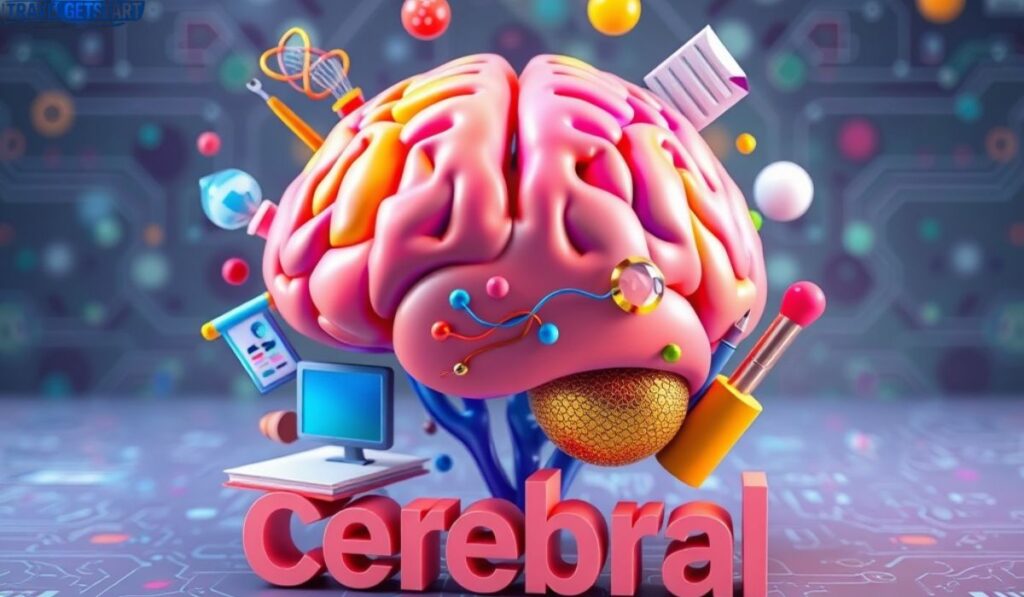The word “cerebral” is often used to describe something related to the brain or intellect. It comes from the Latin word cerebrum, meaning “brain,” and is commonly applied in both scientific and everyday language. In medical contexts, it refers to anything involving the brain, such as cerebral functions or cerebral blood flow. However, its use has extended far beyond just anatomy.
In modern usage, cerebral also describes people, ideas, or works that are deeply intellectual or thought-provoking. Calling a movie, book, or person “cerebral” often implies a focus on logic, analysis, or mental complexity. The term carries cultural significance as it highlights the value placed on intellect and critical thinking in certain societies or fields.
What Does “Cerebral” Mean?
Cerebral refers to anything related to the brain, particularly its functions and structure. It’s commonly used in medical and scientific contexts, such as “cerebral cortex.”
In everyday language, it also describes something intellectual, analytical, or thoughtful—like a “cerebral film” or “cerebral conversation.”
Origin and History of the Word
The word cerebral comes from the Latin cerebrum, meaning “brain.” It entered English through French in the early 19th century.
Initially used in medical contexts, its meaning broadened over time to include intellectual and abstract subjects, especially in literature and art.
Is “Cerebral” Slang or an Acronym?
No, cerebral is not slang or an acronym; it’s a formal, dictionary-recognized word with clear Latin roots.
It is used in both professional and casual contexts but always retains its original, non-slang meaning tied to intellect or the brain.
Pronunciation and Spelling
The word is spelled C-E-R-E-B-R-A-L — and it stays the same in both medical and casual uses.
Pronunciation
Cerebral can be pronounced in two common ways, depending on the region:
- /ˈser.ə.brəl/ – common in American English
- /səˈriː.brəl/ – more common in British English
How Is “Cerebral” Used Today?

Today, cerebral is used to describe anything related to the brain or to characterize ideas, works, or people as intellectual and thought-provoking.
“Cerebral” is widely used to
Medicine
- Cerebral palsy – A neurological disorder affecting muscle coordination.
Example: “The child was diagnosed with cerebral palsy at an early age.” - Cerebral hemorrhage – Bleeding in the brain, often life-threatening.
Example: “The patient was rushed to surgery after suffering a cerebral hemorrhage.” - Cerebral cortex – The outer layer of the brain responsible for higher thinking.
Example: “The cerebral cortex plays a key role in memory and consciousness.”
Education
- Cerebral learning style – Emphasizes logical, analytical thinking.
Example: “She thrives in math and science due to her cerebral learning style.” - Cerebral approach to studying – Focuses on deep understanding, not just memorization.
Example: “His cerebral approach helped him excel in philosophy.” - Cerebral classroom environment – Encourages discussion, debate, and critical thinking.
Example: “The professor fostered a cerebral atmosphere that challenged every student.”
Media & Entertainment
- Cerebral films – Movies that explore complex, intellectual themes.
Example: “Christopher Nolan is known for making cerebral films like Inception.” - Cerebral TV shows – Series that require focus and thought to follow.
Example: “Westworld is a cerebral show that blends science fiction with philosophy.” - Cerebral characters – Thoughtful, analytical individuals in fiction.
Example: “Sherlock Holmes is one of literature’s most iconic cerebral characters.”
Everyday Conversation
- Describing someone as cerebral – Means they are highly intellectual or thoughtful.
Example: “She’s very cerebral—always deep in thought about something complex.” - Using it to praise thinking – Often used to compliment someone’s intellect.
Example: “That was a cerebral response—you really analyzed the problem well.” - Casual usage in hobbies or interests – Refers to brainy or mentally stimulating activities.
Example: “Chess is such a cerebral game; it really makes you think ahead.”
Examples in Sentences
- The movie was too cerebral for some viewers, but I loved its depth.
- She has a very cerebral way of approaching problems—calm and analytical.
- He suffered a cerebral stroke and needed immediate medical attention.
- The novel’s plot was slow, but its cerebral themes made it worth reading.
- As a scientist, she naturally prefers cerebral discussions over small talk.
- The lecture felt too cerebral for first-year students unfamiliar with the topic.
- He’s not emotional—he’s more of a cerebral thinker.
- Cerebral palsy affects muscle coordination due to brain development issues.
Deeper Meanings and Metaphorical Use
- Cerebral as intellectual depth – Often used to describe ideas that require deep thinking.
Example: “Her poetry is cerebral, layered with philosophical meaning.” - Cerebral as unemotional – Sometimes implies a person is overly rational or detached.
Example: “His cerebral nature made it hard for him to connect emotionally.” - Cerebral style in art – Describes art that challenges the mind rather than appeals to emotion.
Example: “The film’s cerebral style left the audience quietly reflective.” - Cerebral leadership – Implies thoughtful, strategic decision-making.
Example: “Her cerebral leadership style values logic over charisma.” - Cerebral humor – Witty, brainy humor that relies on wordplay or intellectual references.
Example: “The show’s cerebral humor isn’t for everyone, but it’s clever.” - Cerebral narrative – In storytelling, it refers to plots that focus on ideas or inner thoughts.
Example: “The book takes a cerebral approach to the question of identity.” - Cerebral energy – Used metaphorically to describe intense mental focus.
Example: “You could feel the cerebral energy in the debate room.” - Cerebral culture – Describes environments that value knowledge, critical thinking, and discussion.
Example: “The university promotes a cerebral culture rooted in inquiry and reason.”
Commonly Related Words
- Brain – The organ associated with cerebral functions; directly linked to the term’s meaning.
- Intellectual – Describes someone who engages in deep thinking, often used similarly to cerebral.
- Analytical – Involves breaking things down logically, a key trait of cerebral thinking.
- Neurological – Relates to the nervous system and brain, often used in medical contexts with cerebral.
- Thoughtful – Indicates deep or careful thinking, often used to describe a cerebral person.
- Cognitive – Pertains to mental processes like thinking, memory, and problem-solving.
- Rational – Based on reason or logic, a quality often associated with cerebral behavior.
- Reflective – Describes someone who thinks deeply or carefully, aligning with the cerebral mindset.
Dictionary Definition
- Relating to the Brain: Most dictionaries define cerebral as something connected to the brain’s physical or medical functions.
Example: “Cerebral cortex” refers to the outer layer of the brain. - Intellectual in Nature: It is also commonly defined as describing intellectual or logical thinking rather than emotional response.
Example: A cerebral film or book requires deep thought to understand. - Serious and Thoughtful: Dictionaries often describe cerebral people or ideas as serious, thoughtful, and focused on understanding complex issues.
Example: A cerebral person enjoys deep discussions and abstract thinking.
Modern Cultural View

In modern culture, cerebral is often seen as a compliment, associated with intelligence, depth, and thoughtfulness. It’s used to describe films, people, or conversations that challenge the mind.
However, in some settings, it can imply being overly analytical or emotionally distant. This dual perception reflects society’s ongoing balance between intellect and emotion.
Why Learning Words Like “Cerebral” Matters
Learning words like cerebral expands your vocabulary and helps you express complex ideas more precisely. It allows for richer communication, especially in academic or professional settings.
It also encourages critical thinking and deeper understanding of language use in various contexts. Knowing such terms helps you engage more effectively in intellectual and cultural discussions.
The Future of the Word “Cerebral”
- Continued Relevance in Medicine
As neuroscience and brain research advance, cerebral will remain essential in medical and scientific language. - Increased Use in Media and Reviews
Describing films, books, and shows as cerebral will become more common as audiences seek smarter, thought-provoking content. - Positive Trait in Professional Settings
Being called cerebral may be increasingly valued in workplaces, especially in fields requiring strategic thinking and analysis. - Greater Awareness Through Education
As education focuses more on critical thinking and cognitive skills, the word cerebral will be more familiar to students and educators alike. - Balanced with Emotional Intelligence
While valued, cerebral may be balanced with emotional traits, reflecting a cultural shift toward combining intellect with empathy.
Frequently Asked Questions
What does “cerebral” mean?
It means something related to the brain or to deep, intellectual thinking.
Is it a positive word?
Yes, it’s generally positive, often implying intelligence or thoughtfulness.
Can I use it in everyday speech?
Yes, especially when describing someone or something as smart, thoughtful, or brain-focused.
Is it only used medically?
No, it’s used in both medical and non-medical contexts, like films, books, and personalities.
What’s a simple synonym?
A simple synonym is intellectual.
Final Thoughts
Understanding the word cerebral offers more than just vocabulary—it provides insight into how we describe intelligence, thought, and brain-related functions. Whether used medically or metaphorically, the term bridges science and culture. Its versatility allows it to describe everything from neurological conditions to complex, thought-provoking ideas.
As society continues to value critical thinking and mental awareness, cerebral remains a powerful and relevant word. It reflects a growing appreciation for intellect in media, education, and everyday life. Embracing such words enriches communication and encourages deeper, more thoughtful engagement with the world around us.





